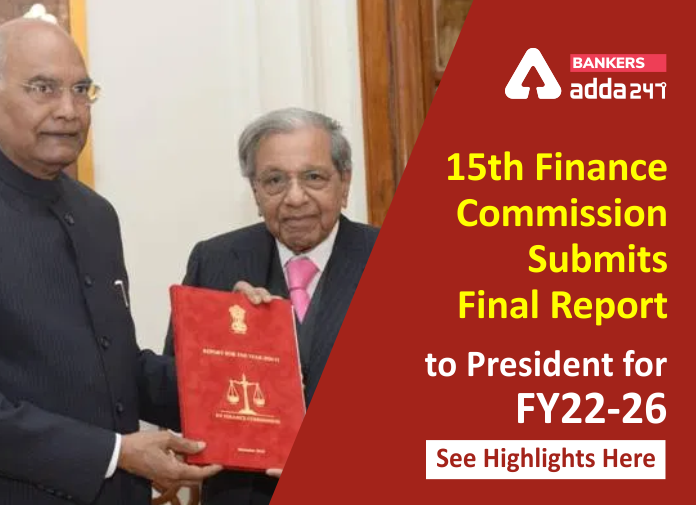Table of Contents
The 15th Finance Commission, which decides the sharing of resources between the Centre and states, submitted its final report for the five-yearly period between 2021-22 and 2025-26 to President Ram Nath Kovind. The title of the report is “Finance Commission in Covid Times”. The report by the commission, headed by NK Singh, comes at a juncture when the Covid-19 pandemic has greatly strained government revenues, shrinking the resource pie, and amid a turbulent Centre-states relationship over payment of the Goods and Services Tax (GST) compensation cess. The 15th commission has reviewed the recommendations of the 14th commission, which was one of its mandates.
According to its terms of reference set by the President, the commission has examined and recommended performance incentives for states in several areas, such as power-sector reforms, adoption of direct benefit transfers, solid waste management, and others.
The 15th Finance Commission has made solutions on this report for 5 monetary years. This report will be introduced in Parliament by the Finance Minister. After this, the authorities will implement the solutions given in the report. This report has been prepared after session with numerous native governments, former finance commissions chairman, the advisory council of the fee and specialists in the sector, in addition to the central and state governments.
The report has been prepared underneath the chairmanship of NK Singh:
The 15th Finance Commission has prepared this report underneath the chairmanship of NK Singh. The report is signed by the chairman of the fee NK Singh, in addition to members Ajay Narayan Jha, Anoop Singh, Ashok Lahiri and Ramesh Chand.
The main recommendations for the devolution of funds between the Centre and the States for the period 2021-22 to 2025-26:
- The Commission has addressed all its unique terms of reference such as considering a new non-lap sable fund for financing national security and defense spending, and offering performance incentives for States that deliver on reforms.
- The main report uniquely titled “Finance Commission in Covid Times” which depicts a set of scales on its cover to denote balance between the Union and the States, the Commission has presented two more volumes as part of its submissions.
- The first one focuses on the State of the Union government’s finances, with an in-depth scrutiny of key departments, the medium-term challenges facing the Centre and a roadmap for the future. The other volume is entirely dedicated to States, with the finances of each analysed in great depth.
- The report’s Volume I and II contain the main report. Volume III is devoted to the central government and examines key departments in greater depth, with the medium-term challenges and the road map ahead. Volume IV is devoted to the states.
Though its original remit was to make recommendations for the period 2020-21 to 2024-2025:
- The Commission had submitted an interim report for 2020-21 last year, stressing that it was difficult to make projections for five years when the economy is slowing down after structural reforms like GST and the insolvency code.
- The interim report had reduced States’ share in the divisible pool of taxes from 42% to 41% for the current year, after the dissolution of Jammu and Kashmir as a State.
What is the Finance Commission?
The Finance Commission is appointed by the President under Article 280 (1) of the Constitution of India. The commission is formed by consisting of a chairman and four other members. The President recommends how to distribute the net receipts of tax between the Union and the States and the revenue should be distributed among the States. The Commission also recommends on grant or assistance to the States out of the accumulated fund under Article 275.



 Adda247 Launched the Coaching with Degre...
Adda247 Launched the Coaching with Degre...
 Financial Regulators In India
Financial Regulators In India
 What is the Monthly Salary of Bank PO?
What is the Monthly Salary of Bank PO?





